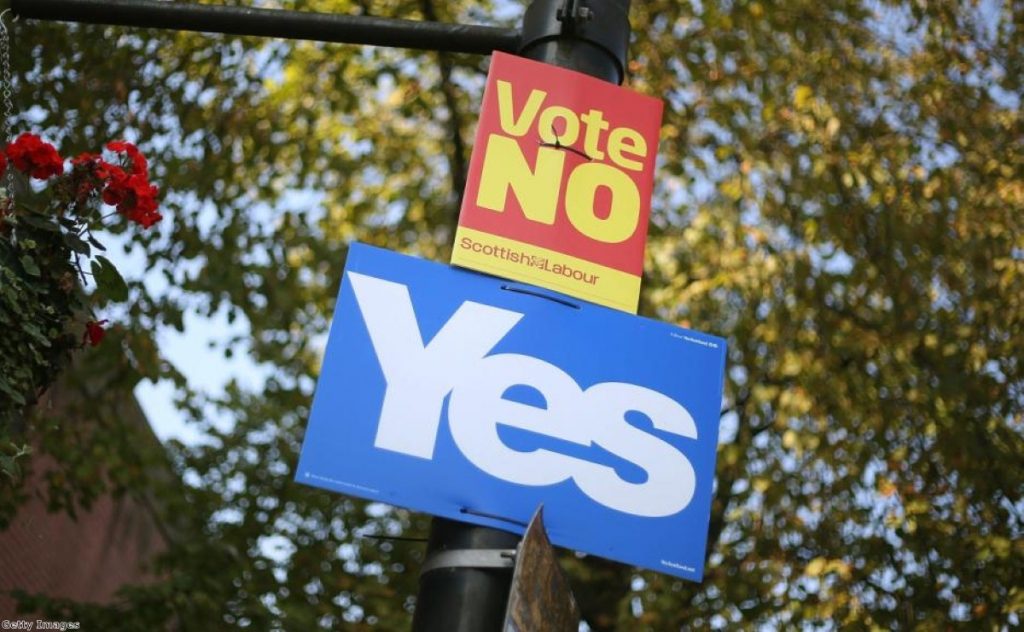Scottish independence referendum: Relief follows panic as No campaign restores lead
Economic jitters appear to have halted the nationalists' polling momentum, pushing Alex Salmond on to the defensive with six days to go until the Scottish independence referendum.
Last night saw a Survation poll for the Daily Record newspaper put the 'No' campaign on 53% to the 'Yes' campaign's 47% after undecideds were excluded.
That prompted Better Together's campaign director Blair McDougall to insist: "This fight for Scotland's future will go right down to the wire, but it's one we will win."
Concerns over the economic implications of independence appear to be assisting the unionist cause, helped by banks Lloyds and Royal Bank of Scotland saying they would move parts of their business down south in the event of a 'Yes' vote.


RBS' declaration in a statement that Scottish independence would make it "necessary to re-domicile the bank's holding company" was dismissed by Salmond, who said it was about "brass plaques" rather than "operations or jobs".
He attacked the BBC's reporting of their statement in an interview on BBC Scotland and accused newspapers of failing to realise RBS' warnings were "recycling" previous statements.
Salmond quoted a letter from RBS chief executive Ross McEwan making clear the change would have "no impact" on everyday banking services for customers based in Scotland.
But the first minister also has to contend with an editorial from the Financial Times in which the newspaper formally endorses 'No', saying: "The case for union is overwhelming. The path of separation is a fool's errand."
Salmond has blamed Monday's drop in the pound on Downing Street's revelation that it has no contingency plans for independence and "the unreasonable posture of the UK government".
The nationalists' strategy continues to be to argue for a currency union, despite the three Westminster leaders having united to make clear they would prevent an independent Scotland using the pound.
Scottish finance minister John Swinney downplayed Bank of England governor Mark Carney's warning that an independent Scotland would have to cede sovereignty as part of currency union.
And he suggested the panicked response of the three party leaders showed their ability to come to agreement.
"If we get a 'yes' vote a week today, what we'll have is an emphatic mandate to ensure that Scotland secures that currency union on behalf of the people of Scotland," Swinney told the Today programme. "I'm very confident."
The result remains deeply uncertain despite the Better Together 'boomerang', however.
Survation, which carried out its fieldwork from September 5th to September 9th, put 'Yes' up one point on 42% and no unchanged on 48%, leaving ten per cent yet to make up their mind.
no matter what they say it is all bluff .. RBS would never.. Never leave nor BP Shell.. Bluff #indyref pic.twitter.com/bRgyEEPJce
— ARTIST TAXI DRIVER (@chunkymark) September 10, 2014
Around 50 Labour MPs boarded the 07:30 train to Glasgow from London Euston this morning, with the total number of the party's backbenchers expected to rise to 100 before the vote.
But Ukip leader Nigel Farage warned their presence – and those of the three party leaders in yesterday's dramatic day of campaigning – would only increase the potency of an "anti-English" vote.
"The choice on the ballot plays into Salmond’s hands: vote to stay subject to the English toffs at Westminster who stole their country under the threat of bankruptcy 300 years ago – the Act of Union – or vote to throw off the hated English yoke," he wrote in an article for the Telegraph newspaper.
"These terms make it pretty difficult for Mr Cameron to campaign in Scotland and my experiences confirmed this.
"The hoodlums who sought to break up my meetings and confined me to a pub told me to go back to England; to them, an Englishman should have no voice in Scottish political debate. Their position is merely the extreme end of Mr Salmond's."












